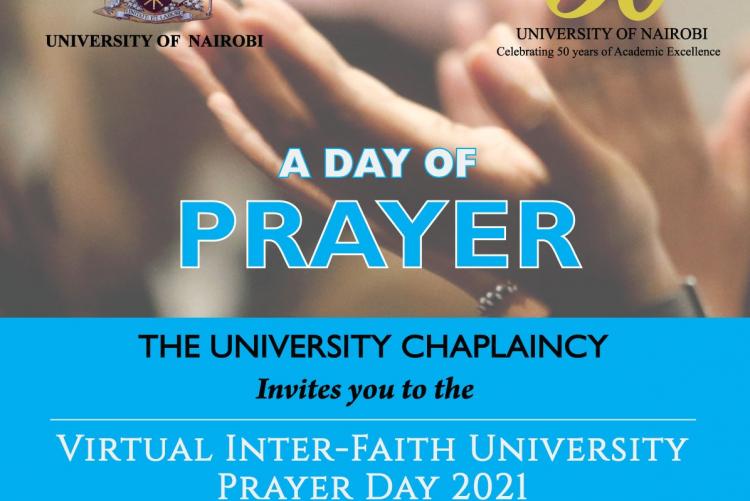The University of Nairobi endeavors to provide an enabling environment in which the student will hopefully grow into a whole human person. The University therefore recognizes the need for services of a spiritual nature, over and above the other services we offer. University chaplaincy as a religious or spiritual based institution is mandated with the role of spiritual wellness for university staff and students. The most widely acknowledged function of the chaplain reflects his pastoral responsibilities.
The Chaplaincy is staffed by religious leaders (Protestant, Catholic and Muslim) and offers general support and guidance while also drawing attention to the spiritual value within the various faiths. The services of the Chaplaincy are open to the entire University Community. Some of these services and activities include guidance, conducting religious ceremonies, for instance, weddings, and baptisms, burials, conducting regular worship services, hosting seminars and workshops, and coordinating religious activities at the University.
Historical Background of Chaplaincy in Kenya
In his unpublished works on the history of the Anglican chaplaincy in Kenya School of Government, Rev. Samuel Chege explains the recommendations of Commission Phelps stokes that led to the Colonial Government rural education and industrial training for natives. The recommendations were adopted in 1925 when the Jean’s School (today’s Kenya School of Government in Lower Kabete Campus) was opened to train artisans.
The Church Missionary Society (CMS) which enjoyed good rapport with the Colonial Government established CMS chaplaincy to give pastoral and emotional care to staff, students and families of colonial government educationists in the schools. With the dawn of independence in Kenya, the same arrangements continued. It has been the practice of government facilities such as military, prisons, schools and colleges to have one established mainline Protestant and Catholic Church minister to give pastoral care to all protestant and Catholic staff, students, families and inmates, Chege (2014). The inclusion of Muslim Chaplain was later adopted to care for the Islamic faith. The same model was adopted in Kenya’s public universities an approach used by the University of Nairobi.
Current Activities of University Chaplaincy
- Spiritual health care support: Chaplaincy have focused on understanding on their role in health care as well as clinical outcomes of their service. Findings supported the hypothesis that chaplaincy services are significantly associated with lower rates of hospital deaths and higher rates of hospice. This scenario can be actualized in institutions of higher learning through hospital visits. Many stress related deaths are reported in our institutions and chaplaincy has actively provided staff and students’ support services in offering counseling support as a measure of reduction of stress related catastrophes like the Covid 19 pandemic.
- Behavior change: Chaplaincy as an institution driven by spiritual principles are best suited in helping reconstruct lives, to be meaningful and beneficial. Chaplains also play a significant role in shaping the learners paradigm, religious dimensions and in rehabilitation of learners facing disciplinary matters. Our institutions report moral decay not only among students but staff as well. Broken families, drug and substance abuse, poor work ethic and sexual harassment of students by staff are reportedly on the increase in our institutions. Chaplaincy has certainly made its voice heard on these matters and made its contribution in alleviating their negative effects and in working towards eradication of the same.
- Spiritual distress: Distress in institutions is associated with decreased health, depression, loss of income, loss of loved ones among other challenges. Chaplains play an important role in identifying staff in distress and helping them resolve their religious problems. The Chaplains have been readily available to help both staff and students in spiritual distress.
- Mediation and reconciliation: Chaplains also act as mediators and reconciliator, cultural brokers between institutions and its members or between individuals. Tim Hicks in his 2015 report states that there are two things to remember about problems and conflicts in the work place; that they happen all the time and that they are opportunities to improve the system, and relationships. Many institutions are conflict averse. They do not feel comfortable dealing with the conflicts. However the chaplaincy has always been involved in mediation in cases where conflicts have arisen. The purpose of doing this is to make our university community friendly.
- Design religious ceremonies: Religious ceremonies mean conforming to religious rites which are sacred; they are customary ways of celebrating a religious culture. John Fiona points out that a religious ceremony allows us to acknowledge a transition, or a conclusion to end in our lives. A ceremony can help people show that they are united and that they belong. Chaplaincy has achieved this by designing and leading religious ceremonies of worship such as prayer, meditation, observance of holy days, blessings and sacraments, memorial services and funerals and holy day observance.
UoN Annual Prayer Day
It has been a culture of the University of Nairobi community to set aside an Annual Prayer Day for giving thanks to God and seeking for His continued blessings and protection to the University community. In 2020 because of the Covid-19 pandemic, the event was aired Live on the UoN Website: http://www.uonbi.ac.ke/livestream
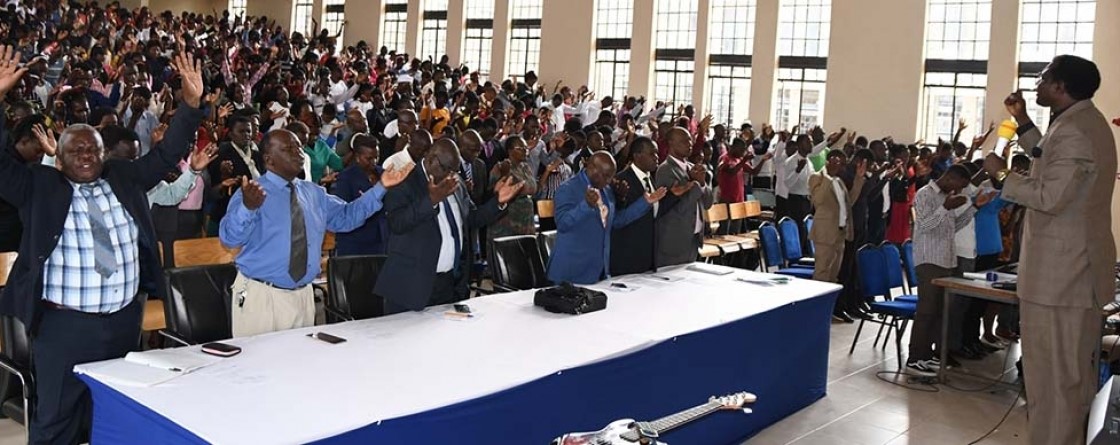
PROTESTANT CHAPLAINCY
The Protestant Chaplain provides leadership, mentorship and guidance to all Christian Unions formed by all Campus Christian unions. In addition to that the Chaplain participates in missions, crusades and door to door evangelism. The Protestant Chaplain serves the Protestant campus community through outreach, worship services and events, pastoral counseling, community building and facilitation of other programs, services, and events. The Protestant Chaplain supports and promotes the presence of a vibrant Protestant community of diverse cultures, ethnicities and confessions on the campuses of the University of Nairobi. The Protestant Chaplain develops programs which strengthens faith for those at all stages of their faith journey and seekers, serve the pastoral needs of UoN students. The Protestant Chaplain collaborates with various offices of the UoN including but not limited to: other Chaplains, the Deans of Students, College Principals, Faculty Deans and Directors and Assistant Deans of Students in various campuses.
Some of the essential functions of the Protestant Chaplain includes
- Spiritual and Pastoral Support: Advising/providing spiritual leadership, guidance and support to all registered Protestant student clubs/groups and providing pastoral counseling for UoN students.
- Spiritual Programming: Weekly Protestant and Inter-Faith worship services, directing Protestant and other religious and spiritual observances for religious holidays, convocations, commencements; developing and assessing programs and services which facilitate Protestant and intra/inter-faith dialogue; and providing engaging trainings for residence hall staff, student peer mentors and others as requested.
- Community Development: Initiating and maintaining outreach and support for the diverse student populations of the University of Nairobi and bridging relationships and participating in activities with off-campus Protestant and other faith communities and their spiritual leaders.
- Teaching Biblical, Religious and Theological courses: The Protestant chaplaincy has had great opportunities to impact and influence the lives of the learners both in class through teaching Biblical, Religious and Theological courses under the Department of Philosophy and Religious Studies.
A number of needy students have also been supported in the course of their studies through the networks provided by the chaplaincy. A number of other students in need of counseling and even rehabilitation have also found the much needed help through the chaplaincy.
Partners and Stakeholders
The protestant chaplain works in partnership with other recognized and registered churches and organizations in providing spiritual guidance to the vast population of University of Nairobi students. The partnerships are strictly in regard to spiritual matters. Among the churches and organizations are:-
Churches
- Presbyterian Church of east Africa (PCEA)
- Anglican Church of Kenya (ACK)
- Africa Inland Church (AIC)
- Mamlaka Hill Chapel
- Mavuno Church
- Deliverance Church
- Nairobi Pentecostal Church (NPC)
- Redeemed Gospel Church
Organizations
- Fellowship of Christian unions (FOCUS)
- The Navigators
- The Life Ministry
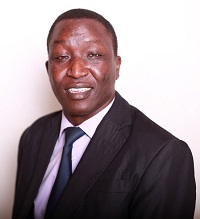
For more information contact:
Rev. Hosea Kiprono Mitei
Protestant Chaplain
University of Nairobi
Cell: 0722 227303
CATHOLIC CHAPLAINCY
The Catholic Church recognizes the need to offer pastoral and spiritual care to her members as commissioned by our Lord Jesus Christ for the salvation of the people of God. In more specialized way the Church provides that care to established institutions such as Schools, Hospitals, Universities, Prisons, Military and also Police. To such that extend a parochial status they are referred to as Chaplaincies. In this regard, the Archdiocese of Nairobi appoints and seconds one of their priest to the University of Nairobi as a Chaplain who therefore offers these services to the University community. The Chaplaincy works under St. Paul University Chapel where the Campus Chaplain ministers. The objective of the chaplaincy is to engage students wholly so to build their faith and develop spiritually. Some of activities includes Choir practice, Fellowships, charity work, outreach Ministries among others. Visit St. Paul’s Chapel website www.stpaulschapel.org
Brief History of Catholic Chaplaincy at the University of Nairobi
As the University of Nairobi celebrates her 50th Golden Jubilee this year (2020), the Catholic Chaplaincy as well marks the same celebrations. Towards the end of the year 1969, a Chapel built proximate to the University and names after the great Apostle Paul was completed. The then Archbishop of Nairobi, J.J. Marcarthy had realized the need for pastoral care for a University community and hence bought the piece of land and built the Chapel. He appointed priests to the chapel some of whom like Fr. Joseph Donders were involved in the establishment of the Department of Philosophy and Religious Studies. And the chain has never been broken to this day, that the Archdiocese has had appointments of Priests to the Chaplaincy. St. Paul’s become therefore the seat of the Chaplain from where he operates to serve all the campuses.
Collaboration with other Priests.
With the growth of the University both in the number of campuses and students, and having only one Chaplain, the chaplaincy has established relationships with a number of Religious Orders who have interest in campus ministry. The arrangement is such that priests will serve various campuses as follows:
- Dominicans - Kikuyu and Lower Kabete Campus
- Consolata - College of Health Sciences
- Jesuits - Kenya Science Campus.
The above groups of priests collaborates in Ministry and the Chaplain coordinates the activities that are necessary for the services of the community. The rest of the campuses are directly served by the Chaplain and the team of priests that reside with him at St. Paul’s chapel
Pastoral Activities.
The role of a chaplaincy in any institution is mainly the spiritual care of that particular community. This is achieved through various activities and mainly for the Catholics the celebration of Mass. We therefore have a weekly mass in all the campuses on different days of the week, and Sunday Mass in all the Campuses. Mombasa, Kisumu and Parkland Campuses though join the local Catholic Churches in their proximity.
In addition to the Mass, the Catholic Chaplain organize Spiritual talks handling various topics that relate to young people in our times and hold open discussions for both moral and spiritual growth. The Chaplain often looks for resource persons who may include professional, Parents and alumni to come and engage the students as well as mentor them. Every Friday evening, we hold meetings in all Campuses, during these meetings we may show the students a Movie or hold the said discussions. The rationale behind doing this on Friday is that instead of the students getting to other things owing to the fact that Saturday is free, we hold them engaged in something constructive and that helps their lives.
Other than the above general activities, every Campus has particular devotional groups where students come together for prayer. Further, there are Bible study groups in every Campus and members meet in the halls of residence in the evenings of Sunday. The Catholic Chaplaincy at the moment leads with the best Choir in the Association of Catholic Chaplaincies in Kenya. Each Campus has recorded their music which sale of the same makes proceeds that help their activities.
Every year for the last Eleven (11) years, the Catholic Students have gone out on mission to various places in the country, most time preferring places where development is lagging behind. The aim of the mission is outreach to other young people in lass privileged parts of the Country, to promote the need to education and faith in God. This year has however been hampered by the prevailing pandemic. Among other activities that the Chaplaincy coordinate address the needs for the staff. There are established prayer groups in the campuses where the Chaplain meets the staff and pray together. Those with personal pastoral and spiritual needs as well are ministered.
The Future of Catholic Chaplaincy
The testimony of many is that they are because of inspiration that they got through the Chaplaincy of the University. The satisfaction of a Chaplain just as that of a teacher is drawn from such statements from former students. Based on this and with the support from the establishment of the office of the dean of students, we look forward to more robust involvement of students in the various activities. Blending the chaplaincy in other functions of the University, so that the life of a student once oriented properly will be holistically seen to be transformed in the same student at graduation, and so come back with testimony of inspiration.
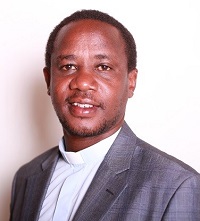
For more information contact:
Fr. Peter N. Kaigua
Cathoic Chaplain
University of Nairobi
Cell: 0720 972 532
MUSLIM CHAPLAINCY
The office of the University Muslim Chaplain (Imam) co-ordinates its activities with the Muslim Students Association of the University of Nairobi (MSAUN) which is the umbrella body for all Muslim Students at the University of Nairobi. MSAUN’s activities includes: First years orientation, farewell program, Ramadhan ifar (breaking of the fast) and suhur programmes. MSAUN organizes annual activities that include, inter alia, Quran competition, medical camp and career exhibitions country-wide.
Brief background of the Muslim Chaplaincy at the University of Nairobi
It is definitely not known for sure when the Muslim chaplain (Imam) was incorporated to the chaplaincy offices at the University of Nairobi. What is known is that the Muslim chaplain was at first seconded to the university as a volunteer to provide the services to the Muslim students at the campuses. The services on this basis were provided by a Pakistani expatriate, Prof. Muhammad Husayn Maalik (famously known as Prof. Maalik) in the early 1980’s.
Two Muslim NGO’s, Islamic Foundation and Young Muslim Association (YMA) were instrumental in bringing the professor to the University. The two NGO’s provided for the monthly salary while the university provided for the house. Prof. Maalik continued providing the chaplaincy services till he became senile, when his family members took him back to Pakistan.
After his departure, Prof. Abdul-Ghafur El-Busaidy, who was in the department of Chemistry, University of Nairobi in addition to being the chairman, Supreme Council of Kenya Muslims (SUPKEM) commenced talks with the university administration to employ a chaplain to cater for the spiritual growth of the growing Muslim students’ population at the university. The fruit of this journey was realized fully during the tenure ship of the vice-chancellor, Prof. George Albert Magoha.
Thus in 2005 an advert for the post were placed in the Kenyan dailies. Applicants were shortlisted and on the 31st August 2005, the first official Muslim chaplain, Dr. Abdul-Kadir Hashim commenced his work at the university. He continued in his work for a decade after which he joined the faculty of Religious studies and philosophy, University of Nairobi as a senior lecturer but he continued to double up as the acting chaplain for some time.
An advert for the vacancy was placed severally in the dailies with no results. In 2016 another advert was placed culminating in my employment. Imam Mohammed Swaleh Abdallah was appointed into the office of the Muslim Chaplain at the University of Nairobi on the 16th February 2017 with the Grace of Allah.
Current Activities:
Spiritual Nourishment: This is one aspect of life, which is part and parcel of our daily life and especially for a Muslim in that matter for he/ she is required to pray at least 5 times a day. We commenced on-line lectures from the month of May. These programmes were as follows:
Google Meet with Students: The main objective of the activity was to remind ourselves of the bounties and blessings of Allaah upon us and thus be grateful to Him. Being grateful is one of the qualities of Believers. Due to the Grace of Allaah, we should worship Him more than ever especially in this trying moment of the pandemic, COVID – 19. The topics so chosen were to hearken our spirits and do more of worships especially in the Holy month. The Post-Ramadhan Lectures programme commenced again after a recess on the 19th June 2020. It is a weekly programme done on Fridays from 3.00 – 4.00 pm. The main subject of the activity is Who will Profit with A Million Good Deeds? The main objective is to motivate the viewers on how best they can come closer to Allaah, the Creator and serve humanity as well. The link for the lecture is: https://meet.google.com/qwd-kgaq-gba. On the 24th July, we talked about the Eid, which will fall on the 31st and a detail discussion on the qualities of the animal to be sacrificed.
HORIZON TV Live Coverage: As the Muslim Chaplain, of the University of Nairobi I was invited by the host of a programme, the Majlis (the Council), Sh. Raatib Abdun-Nuur at the Horizon TV. The Live programme is aired every Saturday from 11.00 am to 12.00 pm. The main objective of the programme during this period was to teach and educate the viewers on how best to continue serving the Creator. The link for the programmes is #Majlis #MajlisLive #QuestionAndAnswer
KBC English Service Programme: I run an English programme at the above-named station. The programme used to tackle topics, which are geared towards educating and informing the public both Muslims and non-Muslims on Islam: its virtues and beauty. At the moment, we are discussing the history of the last Prophet Muhammad (peace be upon him).
Normal Calls and Short Messages: Periodically, I call the leadership of the various MSAUN chapters to know their situation while at home. The call was also a time to emphasis on them the need and importance of taking precaution under the prevailing condition in the country. At the same time, reminding them that the Islamic Shari‘ah (Law) as embodied in the Qur’an and the Hadiyth wants us to do that.
The Chaplain also send short messages to students to motivate them to cheer-up and have hope. Examples are: “You’re not a bad person because you made a mistake, you’re a bad person, if you don’t learn from that mistake. Be calm, rectify your steps and move forward.” “There is no footprint too small to leave an imprint on this world. Everyone has an impact in the world. Be yourself and keep the Faith. You are a winner.”
Q and A: My lines are always open for queries from the students at any time of their conveniences. Many have been calling for Religious counseling or asking pertinent questions, which have been disturbing them.
Partners and Stakeholders
The former Muslim chaplain, Dr. Hashim did what he could in order to partner and build linkages with Muslim NGO’s, organizations, financial institutions, scholars, individuals, etc for the betterment of the students’ welfare. After being appointed in that capacity I tried as much as possible to arrange meetings between the Muslim bodies and the student’s leadership so that these bodies can understand the students well and there programmes. The UoN Muslim partners are:
- SUPKEM
- Jamia Mosque Committee
- Ummah Foundation
- Maahad Daawah Organisation
- Direct Aid Kenya
- World Assembly Muslim Youth
- Africa Education Trust
- Gulf African Bank
- Islamic Development Bank (ISDB)
- First Community Bank
- MSAUN Alumni
- Parklands Mosque
- Park road Mosque
- Salaam Mosque, South C
- International Institute of Islamic Thought (IIIT)
- Saudi Cultural Attaché
- Patco Industries Limited
- Muslim Students’ Associations of different universities
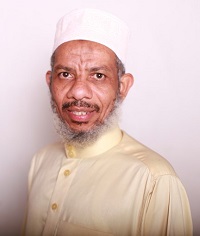
For more information contact:
Mohamed Abdalla Swaleh
University of Nairobi Muslim Chaplain
Mobile: 0722 247 262 / 0790 609 990
E-Mail: l_maawy@uonbi.ac.ke

